Nurses Narratives Staff Nurse G Burns
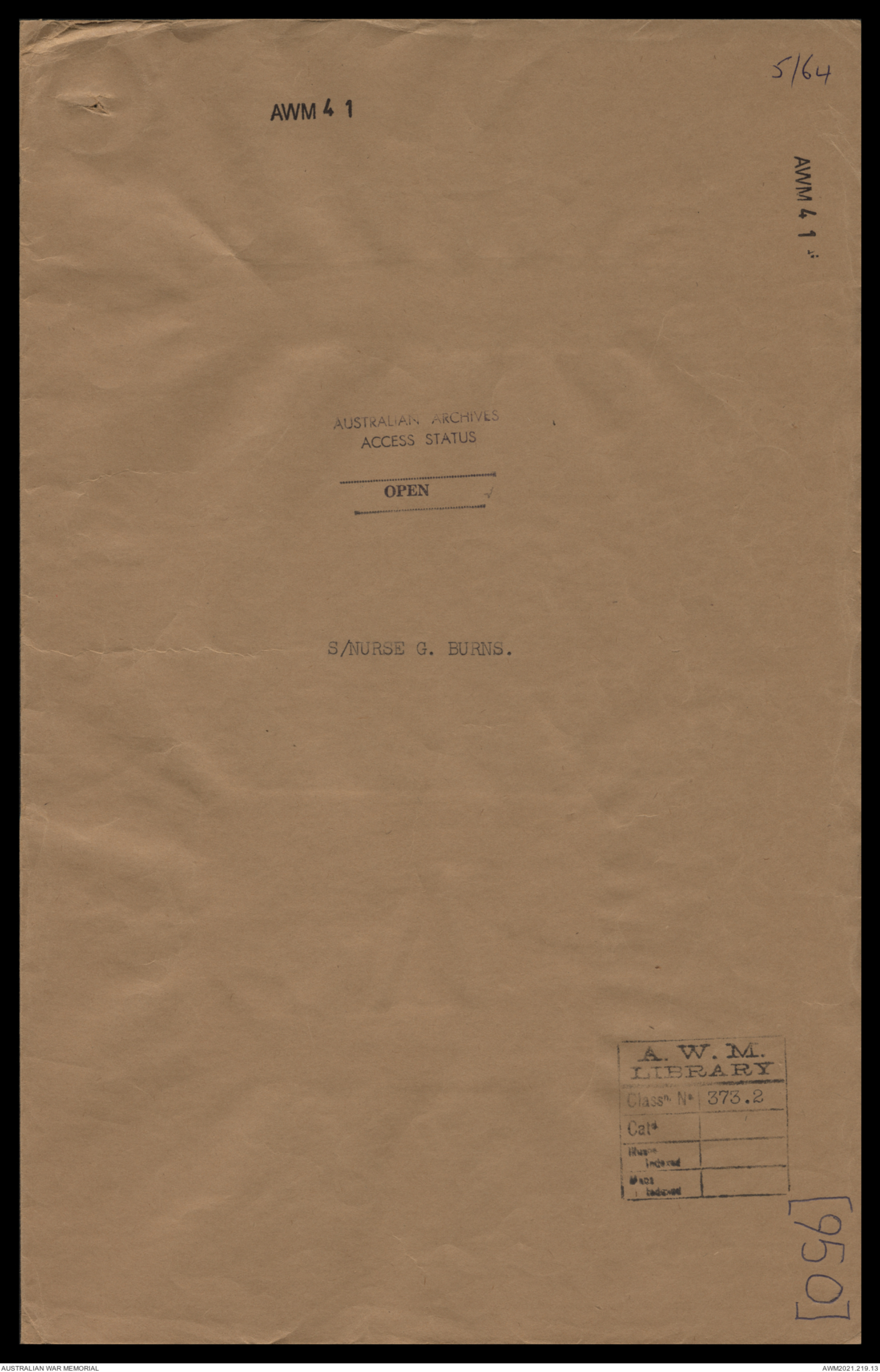
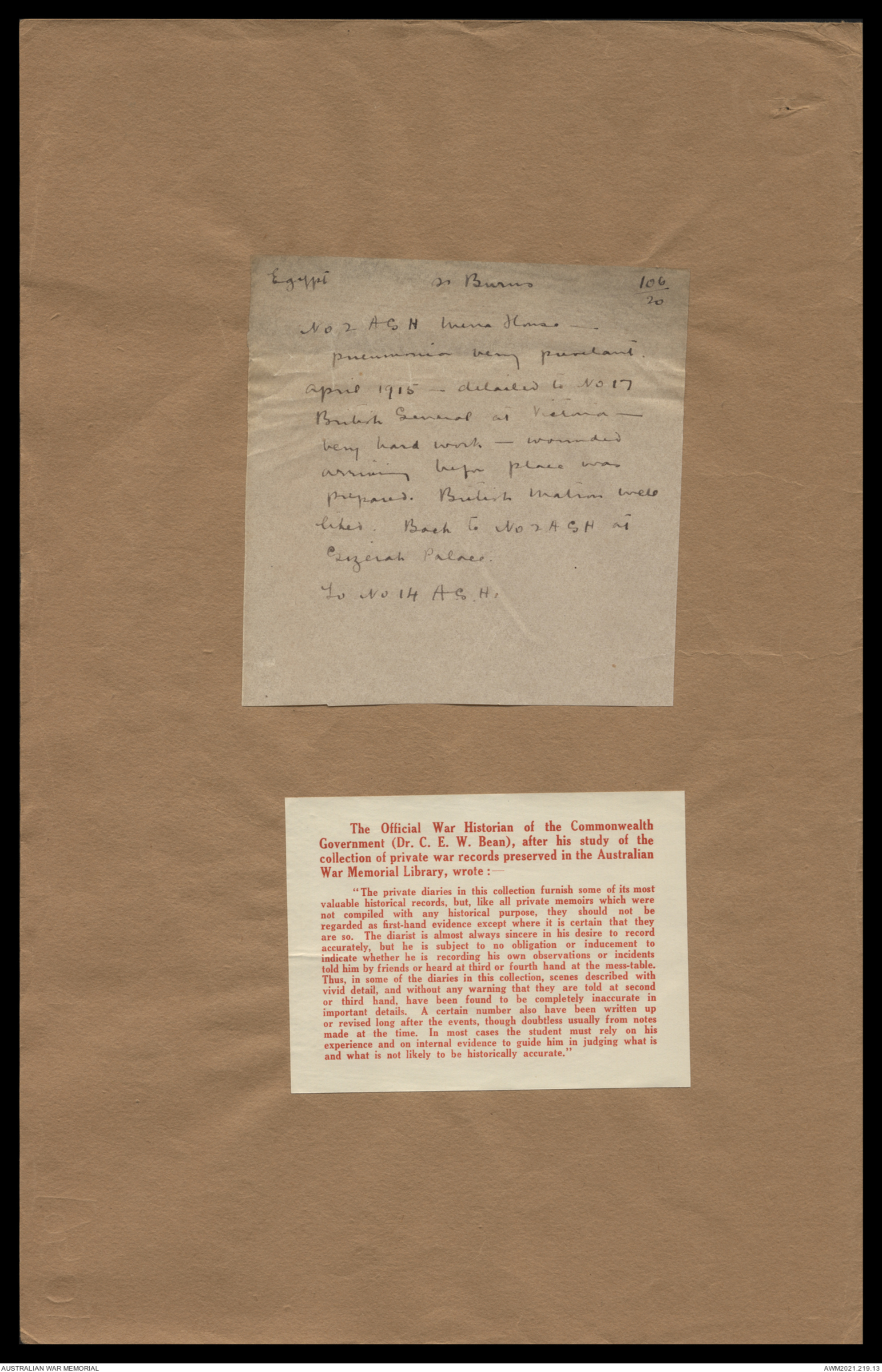
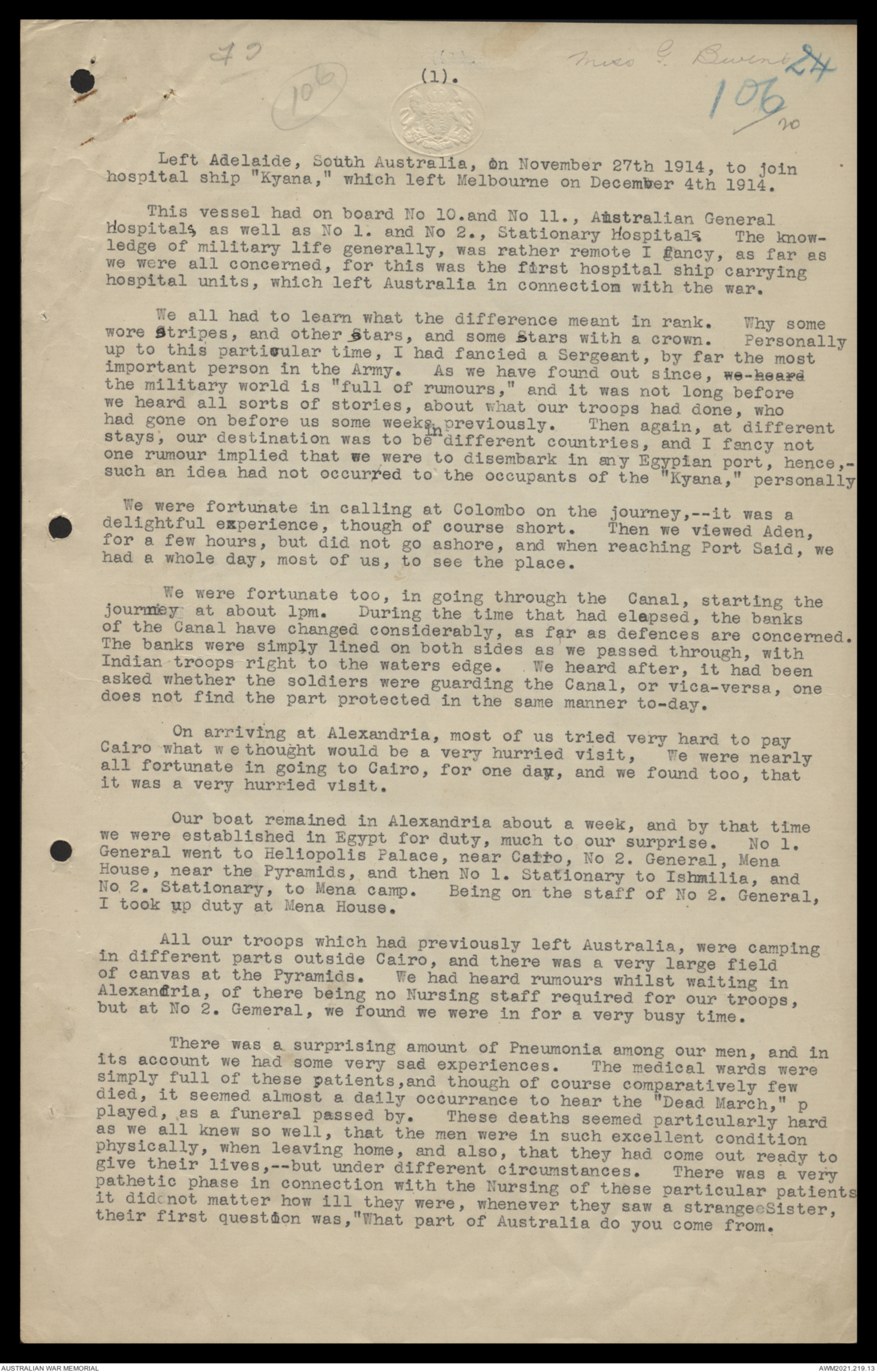
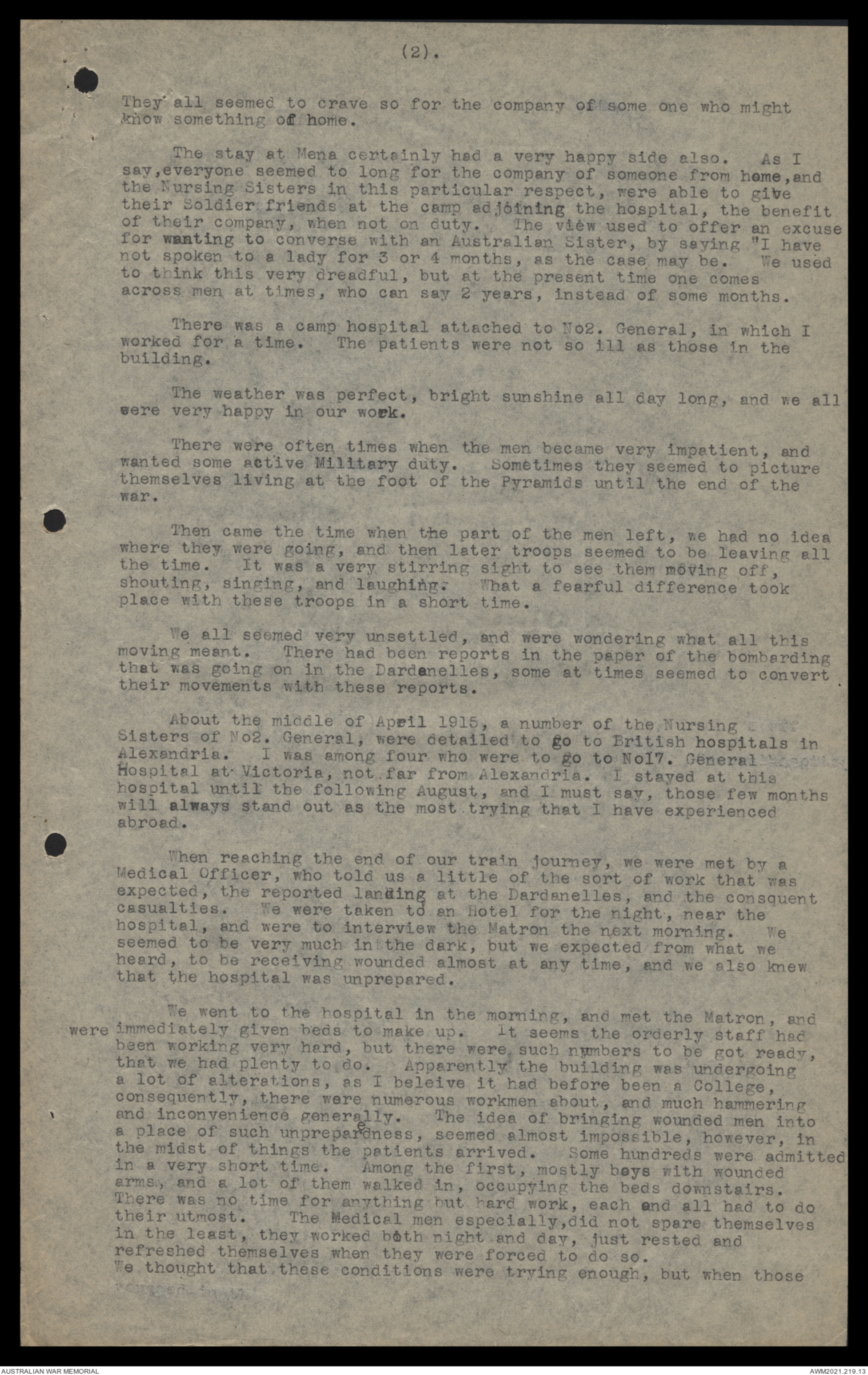
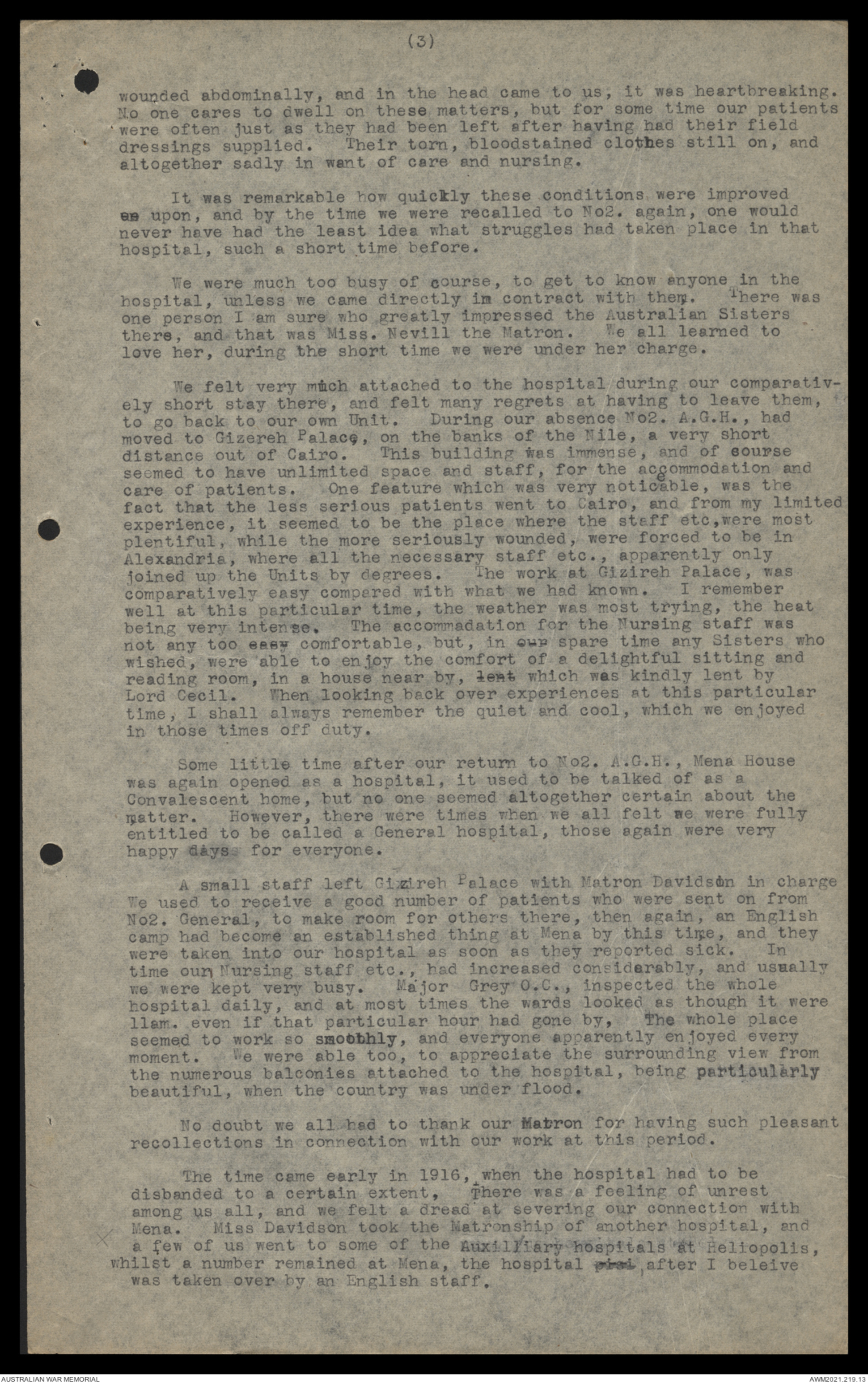
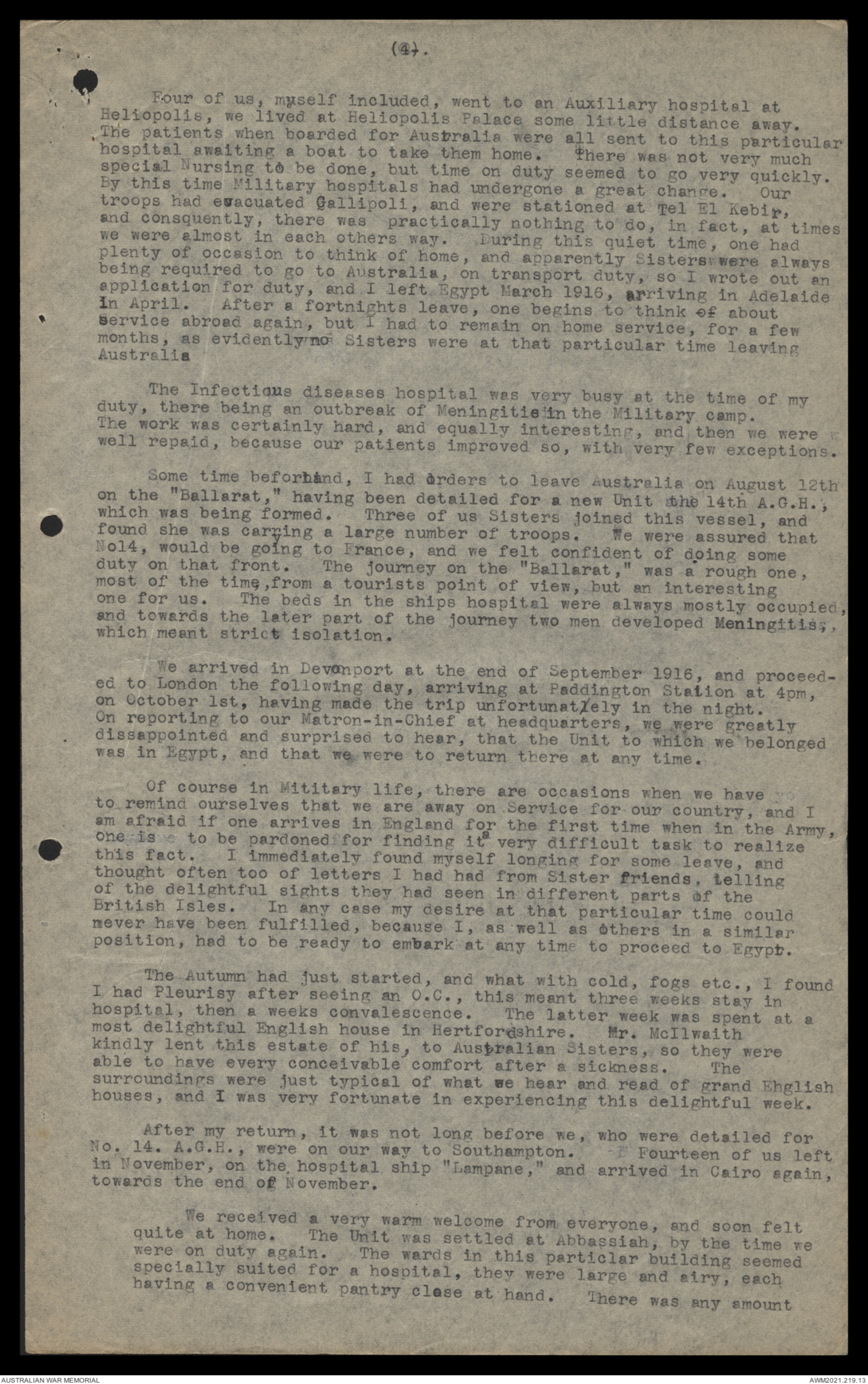
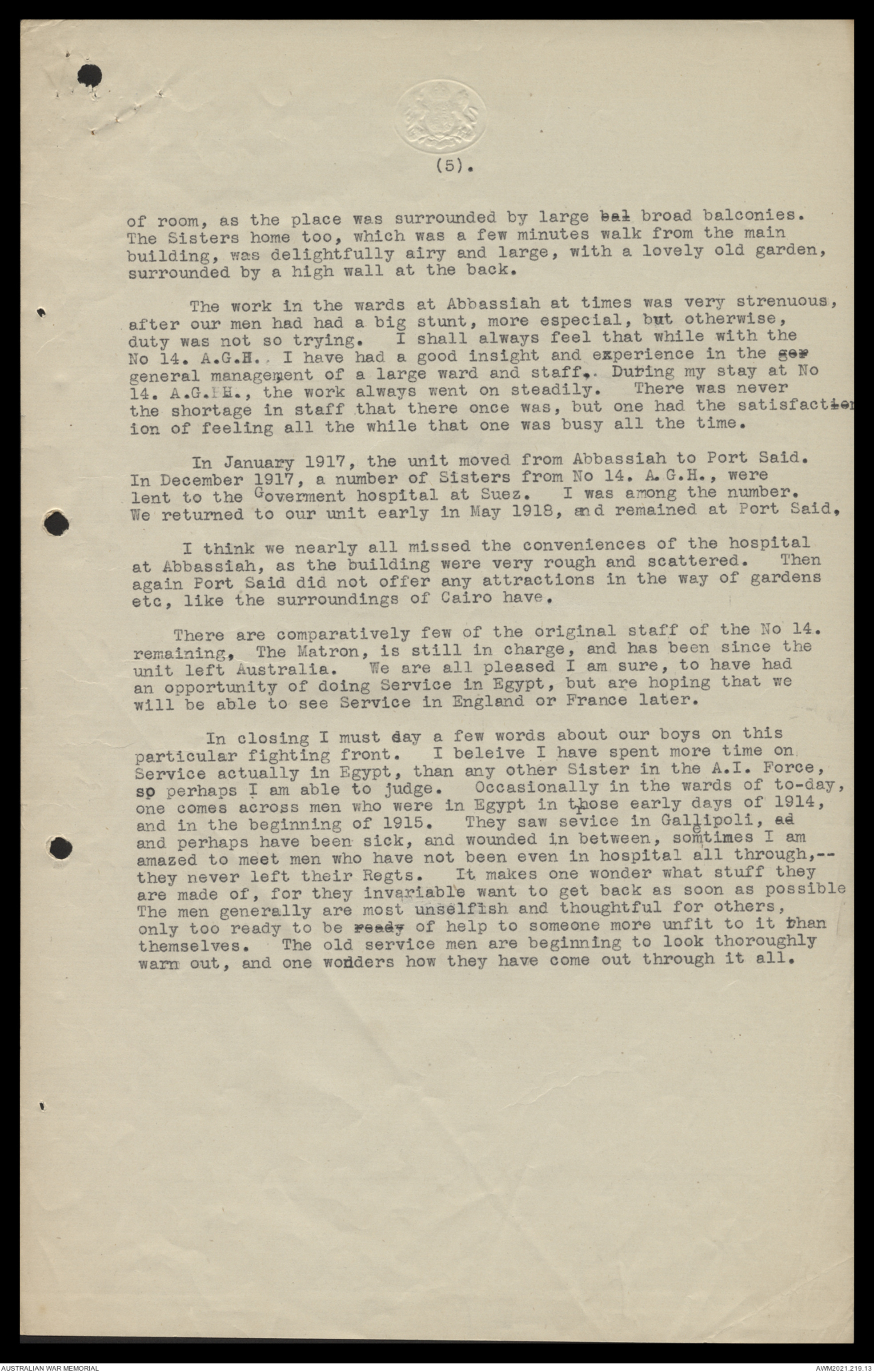
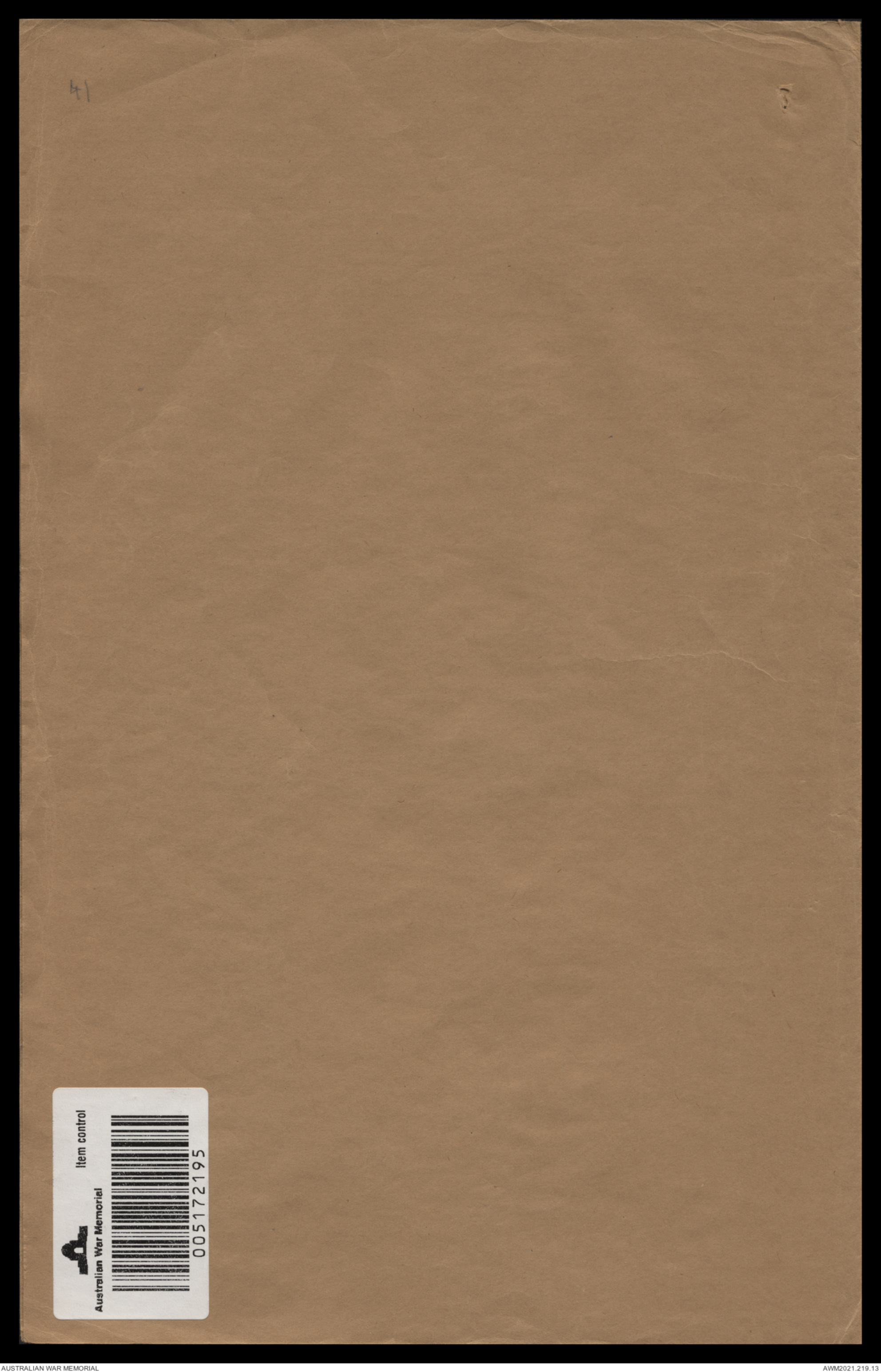
AWM 4 1
5/64
AWM 41
AUSTRALIAN ARCHIVES
ACCESS STATUS
OPEN
S/NURSE G. BURNS.
A.W.M.
Library
Classn NO 373.2
[950]
Egypt Sr Burns 106/20
No 2 A G H Mena House -
pneumonia very prevelant
April 1915 - detailed to No 17
British General at Victoria -
very hard work - wounded
arriving before place was
prepared. British Matron well
liked. Back to No 2 A G H at
Gizerah Palace.
To No 14 A. G. H.
The Official War Historian of the Commonwealth
Government (Dr. C. E. W. Bean), after his study of the
collection of private war records preserved in the Australian
War Memorial Library, wrote:-
"The private diaries in this collection furnish some of its most
valuable historical records, but, like all private memoirs which were
not compiled with any historical purpose, they should not be
regarded as first-hand evidence except where it is certain that they
are so. The diarist is almost always sincere in his desire to record
accurately, but he is subject to no obligation or inducement to
indicate whether he is recording his own observations or incidents
told him by friends or heard at third or fourth hand at the mess-table.
Thus, in some of the diaries in this collection, scenes described with
vivid detail, and without any warning that they are told at second
or third hand, have been found to be completely inaccurate in
important details. A certain number also have been written up
or revised long after the events, though doubtless usually from notes
made at the time. In most cases the student must rely on his
experience and on internal evidence to guide him in judging what is
and what is not likely to be historically accurate".
(1). Miss G. Burns
106/20 19 106
Left Adelaide, South Australia, on November 27th 1914, to join
hospital ship "Kyana," which left Melbourne on December 4th 1914.
This vessel had on board No 10.and No 11., Australian General
Hospitals, as well as No 1. and No 2., Stationary Hospitals. The knowledge
of military life generally, was rather remote I fancy, as far as
we were all concerned, for this was the first hospital ship carrying
hospital units, which left Australia in connection with the war.
We all had to learn what the difference meant in rank. Why some
wore stripes, and other stars, and some stars with a crown. Personally
up to this particular time, I had fancied a Sergeant, by far the most
important person in the Army. As we have found out since, we-heard
the military world is "full of rumours," and it was not long before
we heard all sorts of stories, about what our troops had done, who
had gone on before us some weeks previously. Then again, at different
stays, our destination was to be in different countries, and I fancy not
one rumour implied that we were to disembark in any Egypian port, hence,-
such an idea had not occurred to the occupants of the "Kyana," personally
We were fortunate in calling at Colombo on the journey,--it was a
delightful experience, though of course short. Then we viewed Aden,
for a few hours, but did not go ashore, and when reaching Port Said, we
had a whole day, most of us, to see the place.
We were fortunate too, in going through the Canal, starting the
journey at about 1pm. During the time that had elapsed, the banks
of the Canal have changed considerably, as far as defences are concerned.
The banks were simply lined on both sides as we passed through, with
Indian troops right to the waters edge. We heard after, it had been
asked whether the soldiers were guarding the Canal, or vica-versa, one
does not find the part protected in the same manner to-day.
On arriving at Alexandria, most of us tried very hard to pay
Cairo what w e thought would be a very hurried visit, We were nearly
all fortunate in going to Cairo, for one day, and we found too, that
it was a very hurried visit.
Our boat remained in Alexandria about a week, and by that time
we were established in Egypt for duty, much to our surprise. No 1.
General went to Heliopolis Palace, near Cairo, No 2. General, Mena
House, near the Pyramids, and then No 1. Stationary to Ishmilia, and
No 2. Stationary, to Mena camp. Being on the staff of No 2. General,
I took up duty at Mena House.
All our troops which had previously left Australia, were camping
in different parts outside Cairo, and there was a very large field
of canvas at the Pyramids. We had heard rumours whilst waiting in
Alexandria, of there being no Nursing staff required for our troops,
but at No 2. Gemeral, we found we were in for a very busy time.
There was a surprising amount of Pneumonia among our men, and in
its account we had some very sad experiences. The medical wards were
simply full of these patients ,and though of course comparatively few
died, it seemed almost a daily occurrance to hear the "Dead March," p
played, as a funeral passed by. These deaths seemed particularly hard
as we all knew so well, that the men were in such excellent condition
physically, when leaving home, and also, that they had come out ready to
give their lives,--but under different circumstances. There was a very
pathetic phase in connection with the Nursing of these particular patients
it did not matter how ill they were, whenever they saw a strange Sister,
their first question was, "What part of Australia do you come from.
(2).
They all seemed to crave so for the company of some one who might
know something of home.
The stay at Mena certainly had a very happy side also. As I
say ,everyone seemed to long for the company of someone from home ,and
the Nursing Sisters in this particular respect, were able to give
their Soldier friends at the camp adjoining the hospital, the benefit
of their company, when not on duty. The view used to offer an excuse
for wanting to converse with an Australian Sister, by saying "I have
not spoken to a lady for 3 or 4 months, as the case may be. We used
to think this very dreadful, but at the present time one comes
across men at times, who can say 2 years, instead of some months.
There was a camp hospital attached to No2. General, in which I
worked for a time. The patients were not so ill as those in the
building.
The weather was perfect, bright sunshine all day long, and we all
were very happy in our work.
There were often times when the men became very impatient, and
wanted some active Military duty. Sometimes they seemed to picture
themselves living at the foot of the Pyramids until the end of the
war.
Then came the time when the part of the men left, we had no idea
where they were going, and then later troops seemed to be leaving all
the time. It was a very stirring sight to see them moving off ,
shouting, singing, and laughing. What a fearful difference took
place with these troops in a short time.
We all seemed very unsettled, and were wondering what all this
moving meant. There had been reports in the paper of the bombarding
that was going on in the Dardanelles, some at times seemed to convert
their movements with these reports.
About the middle of April 1915, a number of the Nursing
Sisters of No2. General, were detailed to go to British hospitals in
Alexandria. I was among four who were to go to No17. General
Hospital at Victoria, not far from Alexandria. I stayed at this
hospital until the following August, and I must say, those few months
will always stand out as the most trying that I have experienced
abroad.
When reaching the end of our train journey, we were met by a
Medical Officer, who told us a little of the sort of work that was
expected, the reported landing at the Dardanelles, and the consquent
casualties. We were taken to an Hotel for the night, near the
hospital, and were to interview the Matron the next morning. We
seemed to be very much in the dark, but we expected from what we
heard, to be receiving wounded almost at any time, and we also knew
that the hospital was unprepared.
We went to the hospital in the morning, and met the Matron, and
were immediately given beds to make up. It seems the orderly staff had
been working very hard, but there were such numbers to be got ready,
that we had plenty to do. Apparently the building was undergoing
a lot of alterations, as I beleive it had before been a College,
consequently, there were numerous workmen about, and much hammering
and inconvenience generally. The idea of bringing wounded men into
a place of such unpreparedness, seemed almost impossible, however, in
the midst of things the patients arrived. Some hundreds were admitted
in a very short time. Among the first, mostly boys with wounded
arms, and a lot of them walked in, occupying the beds downstairs.
There was no time for anything but hard work, each and all had to do
their utmost. The Medical men especially, did not spare themselves
in the least, they worked both night and day, just rested and
refreshed themselves when they were forced to do so.
We thought that these conditions were trying enough, but when those
(3)
wounded abdominally, and in the head came to us, it was heartbreaking.
No one cares to dwell on these matters, but for some time our patients
were often just as they had been left after having had their field
dressings supplied. Their torn, bloodstained clothes still on, and
altogether sadly in want of care and nursing.
It was remarkable how quickly these conditions were improvedon upon, and by the time we were recalled to No2. again, one would
never have had the least idea what struggles had taken place in that
hospital, such a short time before.
We were much too busy of course, to get to know anyone in the
hospital, unless we came directly in contract with them. There was
one person I am sure who greatly impressed the Australian Sisters
there, and that was Miss. Nevill the Matron. We all learned to
love her, during the short time we were under her charge.
We felt very much attached to the hospital during our comparativ-
ely short stay there, and felt many regrets at having to leave them,
to go back to our own Unit. During our absence No2. A.G.H., had
moved to Gizereh Palace, on the banks of the Nile, a very short
distance out of Cairo. This building was immense, and of course
seemed to have unlimited space and staff, for the accommodation and
care of patients. One feature which was very noticeable, was the
fact that the less serious patients went to Cairo, and from my limited
experience, it seemed to be the place where the staff etc, were most
plentiful, while the more seriously wounded, were forced to be in
Alexandria, where all the necessary staff etc., apparently only
joined up the Units by degrees. The work at Gizireh Palace, was
comparatively easy compared with what we had known. I remember
well at this particular time, the weather was most trying, the heat
being very intense. The accommadation for the Nursing staff was
not any too easy comfortable, but, in our spare time any Sisters who
wished, were able to enjoy the comfort of a delightful sitting and
reading room, in a house near by, lent which was kindly lent by
Lord Cecil. When looking back over experiences at this particular
time, I shall always remember the quiet and cool, which we enjoyed
in those times off duty.
Some little time after our return to No2. A.G.H., Mena House
was again opened as a hospital, it used to be talked of as a
Convalescent home, but no one seemed altogether certain about the
matter. However, there were times when we all felt we were fully
entitled to be called a General hospital, those again were very
happy days for everyone.
A small staff left Gizireh Palace with Matron Davidson in charge
We used to receive a good number of patients who were sent on from
No2. General, to make room for others there, then again, an English
camp had become an established thing at Mena by this time, and they
were taken into our hospital as soon as they reported sick. In
time our Nursing staff etc., had increased considerably, and usually
we were kept very busy. Major Grey O.C., inspected the whole
hospital daily, and at most times the wards looked as though it were
11am. even if that particular hour had gone by, The whole place
seemed to work so smoothly, and everyone apparently enjoyed every
moment. We were able too, to appreciate the surrounding view from
the numerous balconies attached to the hospital, being particularly
beautiful, when the country was under flood.
No doubt we all had to thank our Matron for having such pleasant
recollections in connection with our work at this period.
The time came early in 1916, when the hospital had to be
disbanded to a certain extent, There was a feeling of unrest
among us all, and we felt a dread at severing our connection with
Mena. Miss Davidson took the Matronship of another hospital, and
a few of us went to some of the Auxiliary hospitals at Heliopolis,
whilst a number remained at Mena, the hospital pisi after I believe
was taken over by an English staff.
(4).
Four of us, myself included, went to an Auxiliary hospital at
Heliopolis, we lived at Heliopolis Palace some little distance away.
The patients when boarded for Australia were all sent to this particular
hospital awaiting a boat to take them home. There was not very much
special Nursing to be done, but time on duty seemed to go very quickly.
By this time Military hospitals had undergone a great change. Our
troops had evacuated Gallipoli, and were stationed at Tel El Kebir,
and consquently, there was practically nothing to do, in fact, at times
we were almost in each others way. During this quiet time, one had
plenty of occasion to think of home, and apparently Sisters were always
being required to go to Australia, on transport duty, so I wrote out an
application for duty, and I left Egypt March 1916, arriving in Adelaide
in April. After a fortnights leave, one begins to think of about
service abroad again, but I had to remain on home service, for a few
months, as evidently no Sisters were at that particular time leaving
Australia
The Infectious diseases hospital was very busy at the time of my
duty, there being an outbreak of Meningitis in the Military camp.
The work was certainly hard, and equally interesting, and then we were
well repaid, because our patients improved so, with very few exceptions.
Some time beforhand, I had orders to leave Australia on August 12th
on the "Ballarat," having been detailed for a new Unit the 14th A.G.H.,
which was being formed. Three of us Sisters joined this vessel, and
found she was carrying a large number of troops. We were assured that
No14, would be going to France, and we felt confident of doing some
duty on that front. The journey on the "Ballarat," was a rough one,
most of the time, from a tourists point of view, but an interesting
one for us. The beds in the ships hospital were always mostly occupied
and towards the later part of the journey two men developed Meningitis,
which meant strict isolation.
We arrived in Devonport at the end of September 1916, and proceed-
ed to London the following day, arriving at Paddington Station at 4pm,
on October 1st, having made the trip unfortunatlely in the night.
On reporting to our Matron-in-Chief at headquarters, we were greatly
dissappointed and surprised to hear, that the Unit to which we belonged
was in Egypt, and that we were to return there at any time.
Of course in Mititary life, there are occasions when we have
to remind ourselves that we are away on Service for our country, and I
am afraid if one arrives in England for the first time when in the Army,
one is to be pardoned for finding it a very difficult task to realize
this fact. I immediately found myself longing for some leave, and
thought often too of letters I had had from Sister friends, telling
of the delightful sights they had seen in different parts of the
British Isles. In any case my desire at that particular time could
never have been fulfilled, because I, as well as others in a similar
position, had to be ready to embark at any time to proceed to Egypt.
The Autumn had just started, and what with cold, fogs etc., I found
I had Pleurisy after seeing an O.C., this meant three weeks stay in
hospital, then a weeks convalescence. The latter week was spent at a
most delightful English house in Hertfordshire. Mr. McIlwaith
kindly lent this estate of his, to Australian Sisters, so they were
able to have every conceivable comfort after a sickness. The
surroundings were just typical of what we hear and read of grand Ehglish
houses, and I was very fortunate in experiencing this delightful week.
After my return, it was not long before we, who were detailed for
No. 14. A.G.H., were on our way to Southampton. Fourteen of us left
in November, on the hospital ship "Lampane," and arrived in Cairo again,
towards the end of November.
We received a very warm welcome from everyone, and soon felt
quite at home. The Unit was settled at Abbassiah, by the time we
were on duty again. The wards in this particlar building seemed
specially suited for a hospital, they were large and airy, each
having a convenient Pantry close at hand. There was any amount
(5).
of room, as the place was surrounded by large bal broad balconies.
The Sisters home too, which was a few minutes walk from the main
building, was delightfully airy and large, with a lovely old garden,
surrounded by a high wall at the back.
The work in the wards at Abbassiah at times was very strenuous,
after our men had had a big stunt, more especial, but otherwise,
duty was not so trying. I shall always feel that while with the
No 14. A.G.H.. I have had a good insight and experience in the ger
general management of a large ward and staff. During my stay at No
14. A.G.H., the work always went on steadily. There was never
the shortage in staff that there once was, but one had the satisfaction
ion of feeling all the while that one was busy all the time.
In January 1917, the unit moved from Abbassiah to Port Said.
In December 1917, a number of Sisters from No 14. A. G.H., were
lent to the Goverment hospital at Suez. I was among the number.
We returned to our unit early in May 1918, and remained at Port Said,
I think we nearly all missed the conveniences of the hospital
at Abbassiah, as the building were very rough and scattered. Then
again Port Said did not offer any attractions in the way of gardens
etc, like the surroundings of Cairo have.
There are comparatively few of the original staff of the No 14.
remaining, The Matron, is still in charge, and has been since the
unit left Australia. We are all pleased I am sure, to have had
an opportunity of doing Service in Egypt, but are hoping that we
will be able to see Service in England or France later.
In closing I must say a few words about our boys on this
particular fighting front. I beleive I have spent more time on
Service actually in Egypt, than any other Sister in the A.I. Force,
so perhaps I am able to judge. Occasionally in the wards of to-day,
one comes across men who were in Egypt in those early days of 1914,
and in the beginning of 1915. They saw service in Gallipoli, ad
and perhaps have been sick, and wounded in between, sometimes I am
amazed to meet men who have not been even in hospital all through,--
they never left their Regts. It makes one wonder what stuff they
are made of, for they invariable want to get back as soon as possible
The men generally are most unselfish and thoughtful for others,
only too ready to be ready of help to someone more unfit to it than
themselves. The old service men are beginning to look thoroughly
warn out, and one wonders how they have come out through it all.
Item Control
Australian War Memorial
005172195
 Jacqueline Kennedy
Jacqueline KennedyThis transcription item is now locked to you for editing. To release the lock either Save your changes or Cancel.
This lock will be automatically released after 60 minutes of inactivity.